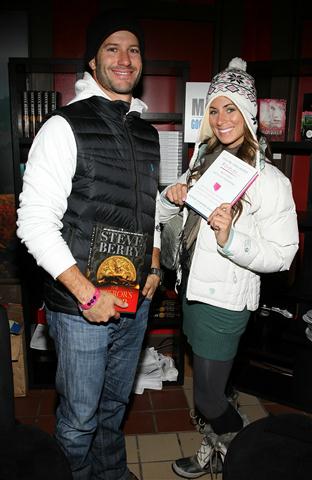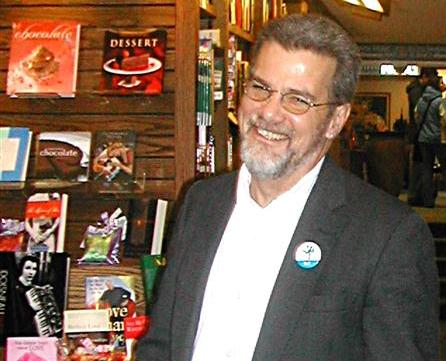 In the fourth quarter ended December 31, net sales at Amazon.com rose 36%, to $12.95 billion, and net income rose 8%, to $416 million. Because the substantial increase was lower than analysts' expectations of more than $13 billion, Amazon's shares dropped 9.8% in after-hours trading to $166.29 a share, after having risen 5.2% to $184.45 during the day. As Sandeep Aggarwal, an analyst at Caris and Co., told the Wall Street Journal, "It's disappointing because we were expecting that investment spending will come down now, but it clearly hasn't."
In the fourth quarter ended December 31, net sales at Amazon.com rose 36%, to $12.95 billion, and net income rose 8%, to $416 million. Because the substantial increase was lower than analysts' expectations of more than $13 billion, Amazon's shares dropped 9.8% in after-hours trading to $166.29 a share, after having risen 5.2% to $184.45 during the day. As Sandeep Aggarwal, an analyst at Caris and Co., told the Wall Street Journal, "It's disappointing because we were expecting that investment spending will come down now, but it clearly hasn't."
Among the tidbits of news Amazon revealed, typically without solid numbers:
- Kindle books have now "overtaken paperback books as the most popular format," even as paperback sales have continued to grow. Amazon is selling 115 Kindle books for every 100 paperbacks. The company had thought this point would not be reached until the second quarter of this year.
- In the quarter, Amazon sold three times as many Kindle books as hardcovers.
- The U.S. Kindle store has more than 810,000 e-books, 670,000 of which retail for $9.99 or less. The company also offers millions of free public-domain titles.
- North American sales rose 45%, to $7.21 billion.
- Media sales in North America rose 12.9%, to $2.37 billion.
- International sales rose 26%, to $5.74 billion.
- International media sales rose 11%, to $2.86 billion.
---
 The
inventory at Al Kitab Bookshop, "situated in the heart of Tunis, just
across the street from the imposing gray interior ministry," was under
strict censorship during the regime of recently deposed Tunisian
president Zine al-Abidine Ben Ali, the Irish Times reported.
The
inventory at Al Kitab Bookshop, "situated in the heart of Tunis, just
across the street from the imposing gray interior ministry," was under
strict censorship during the regime of recently deposed Tunisian
president Zine al-Abidine Ben Ali, the Irish Times reported.
Things
have changed quickly. Books about Ben Ali, his wife Leila Trabelsi,
political repression, Islamism and corruption in the regime are now
available. Al Kitab's owner Selma Jabbes "is still awaiting delivery of
its first order of banned books from Europe; those in the window were
donated by readers and put on display 'to give an idea of how we
suffered here,' " the Times wrote.
Jabbes said the shop
was watched closely by authorities: "All the spies were here regularly.
We sometimes had books taken even after they were authorized, and we had
regular visits to check that we weren't hiding banned books."
---
So it's not Stephen Colbert. Anonymous, the author of
O: A Presidential Novel, published this week by Simon & Schuster, is Mark Salter, a former speechwriter for Senator John McCain,
Time magazine reported yesterday. Among other "in-plain-sight" clues,
Time said,
are that S&S publisher Jonathan Karp worked with Salter on several
McCain books; Karp's descriptions of Anonymous match Salter; and
Anonymous tells a story that only a high-level McCain campaigner would
know.
Neither Salter nor S&S would comment, according to the New York Times.
---
 Patti Smith's follow-up to her National Book Award-winning memoir, Just Kids, will be a mystery novel. The Guardian
reported that she said, "For the last two years... I've been working on
a detective story that starts at St Giles-in-the-Fields in London." The rocker cited Sherlock Holmes and
Mickey Spillane as inspirations.
Patti Smith's follow-up to her National Book Award-winning memoir, Just Kids, will be a mystery novel. The Guardian
reported that she said, "For the last two years... I've been working on
a detective story that starts at St Giles-in-the-Fields in London." The rocker cited Sherlock Holmes and
Mickey Spillane as inspirations.
---
Book trailer of the day: The Book of Freaks by Jamie Iredell (Future Tense Books).
This trailer was created by Bryan Coffelt and Brian Smith, two students
at the Portland State University publishing program. The book is being
published in March by Kevin Sempsell, who also works at Powell's Books
and whose memoir, A Common Pornography, was published by Harper Perennial last year.
---
 In a column for the Atlantic distributed by the Century Foundation, Peter Osnos, founder and editor-at-large of PublicAffairs, reminds us that Judge Denny Chin has yet to accept or reject the Google Book Settlement, reached more than two years. He wrote:
In a column for the Atlantic distributed by the Century Foundation, Peter Osnos, founder and editor-at-large of PublicAffairs, reminds us that Judge Denny Chin has yet to accept or reject the Google Book Settlement, reached more than two years. He wrote:
 "Whatever the outcome, the original settlement and its revisions remain a landmark in the dizzying transformation of information from the traditional means of delivery of printed material to today's increasingly digital options. Why? Because Google originally argued that it had the right, which it declared was a public service, to digitize everything without regard to paying the content creators of copyrighted material. Once Google conceded that was not the case in the 2008 agreement, that particular contention was resolved.
"Whatever the outcome, the original settlement and its revisions remain a landmark in the dizzying transformation of information from the traditional means of delivery of printed material to today's increasingly digital options. Why? Because Google originally argued that it had the right, which it declared was a public service, to digitize everything without regard to paying the content creators of copyrighted material. Once Google conceded that was not the case in the 2008 agreement, that particular contention was resolved.
"In certain respects, however, technology and commerce have overtaken the original dispute. Digitized books can be programmed so that they cannot be copied or printed more than once, which limits the notion of a free-for-all in which authors and publishers lose control of the material. Many books in the public domain (the vast majority of works that have been digitized) are increasingly available from a variety of sources, which reduces Google's omnipotence. Given the extraordinary growth in the use of e-book reading devices (which were barely a factor when the lawsuits against Google were originally filed), the interests of authors and publishers have shifted to getting a fair share of revenues rather than the prospect of receiving no revenues at all."
---
"What will the publishing industry look like after 10 more years of advancing technology?" SF Signal asked a few writers, editors, critics and publishers in the sci-fi industry. A sampling of their predictions:
 "The
chain stores are almost certainly toast, but the surviving independent
stores will be able to compete as they always have--with a curatorial
selection rather than an exhaustive one," author Nick Mamatas predicted.
"If you live on the coasts or in a college town here in the U.S.,
you'll have nice, clean bookstores to go to. If you don't, you'll have a
kiosk in a shopping mall with a POD machine and some sort of instant
download station."
"The
chain stores are almost certainly toast, but the surviving independent
stores will be able to compete as they always have--with a curatorial
selection rather than an exhaustive one," author Nick Mamatas predicted.
"If you live on the coasts or in a college town here in the U.S.,
you'll have nice, clean bookstores to go to. If you don't, you'll have a
kiosk in a shopping mall with a POD machine and some sort of instant
download station."
 Lou
Anders, editorial director of Prometheus Books' Pyr imprint,
anticipates "a vast sea of drek (some of it incredibly popular) with a
smaller number of truly magnificent works (some of it incredibly
popular) and a wealth of 'good stories well told. I'm not being
flippant. E-books don't spell the death of publishing, though we are in a
watershed moment. In ten years, e-books will be the dominant form of
book, and, of course, some books won't even have print editions. But
it's always been about the content, not the delivery mechanism."
Lou
Anders, editorial director of Prometheus Books' Pyr imprint,
anticipates "a vast sea of drek (some of it incredibly popular) with a
smaller number of truly magnificent works (some of it incredibly
popular) and a wealth of 'good stories well told. I'm not being
flippant. E-books don't spell the death of publishing, though we are in a
watershed moment. In ten years, e-books will be the dominant form of
book, and, of course, some books won't even have print editions. But
it's always been about the content, not the delivery mechanism."
---
USA Today noted that 23 of the top 50 books on its bestseller
list sold more digital versions than print, "the highest number yet this
year."
---
If you missed Lewis Carroll's 178th birthday yesterday, you can still celebrate by checking out Flavorwire's "The Evolution of Alice in Wonderland: A Book Cover Odyssey," which looks back at more than 100 years of Alice covers.
---
 Ariana Paliobagis, the new owner of Country Bookshelf, Bozeman, Mont. (Shelf Awareness, January 20, 2011), told Bookselling This Week
about her plans for the store, where she has worked for five years as a
bookseller. "The store is in beautiful shape; we have a great
selection; and I have an incredible staff of really dedicated
booksellers," Paliobagis said. Still she plans "to bring the store into
the 21st century" by expanding its online presence. In the past two
years, she had created a website, opened a Twitter account and started
an e-mail list. Soon she aims to sell e-books via Google eBooks.
Ariana Paliobagis, the new owner of Country Bookshelf, Bozeman, Mont. (Shelf Awareness, January 20, 2011), told Bookselling This Week
about her plans for the store, where she has worked for five years as a
bookseller. "The store is in beautiful shape; we have a great
selection; and I have an incredible staff of really dedicated
booksellers," Paliobagis said. Still she plans "to bring the store into
the 21st century" by expanding its online presence. In the past two
years, she had created a website, opened a Twitter account and started
an e-mail list. Soon she aims to sell e-books via Google eBooks.
---
North Baltimore Patch has published a series of q&a interviews with six current and former bookstore owners in Baltimore: Rupert Wodolowski, owner of Normal's Books and Record; Benn Ray, co-owner of Atomic Books; Kate Khatib, co-owner of Red Emma; Kevin Johnson, owner of Royal Books; Stan Modjesky, owner of Book Miser, which closed in 2004; and Susan Weis-Bohlen, owner of breathe books.
 Weis-Bohlen drew a nice distinction between chain and independent bookstores: "Small bookstores can change very quickly. When we see the tide rising or receding, we can act swiftly to make changes--reduce inventory, increase the mix of books and gifts, add more special events to draw people to us. Stores that react slowly to change are usually the ones that don't make it. We constantly have to have our eyes open, scanning the horizon, and knowing what people want and how to bring it to them."
Weis-Bohlen drew a nice distinction between chain and independent bookstores: "Small bookstores can change very quickly. When we see the tide rising or receding, we can act swiftly to make changes--reduce inventory, increase the mix of books and gifts, add more special events to draw people to us. Stores that react slowly to change are usually the ones that don't make it. We constantly have to have our eyes open, scanning the horizon, and knowing what people want and how to bring it to them."
---
Pets publisher TFH Publications and Discovery Communications have renewed for five years their co-branding publishing agreement, adding these two new products:
Animal Planet Complete Guide books on a specific pet topic. The first, Animal Planet Complete Guide to Dog Care, appears next month.
Dogs 101, a series of books based on the spirit of Animal Planet's successful TV show. Eight breed-specific Dogs 101 titles will be released in 2011, beginning in July.
"In a good used bookstore, looking means buying. At least for me. Honestly, I have no idea what all this fuss is over e-books and Kindle: My idea of paradise is endless hours browsing in bookstores run by book buyers who know something about good literature and great presses. Heaven is losing hours carefully moving one pile of books aside to expose other rows of books, in search of the book I forgot I wanted, or never knew about before now, or never saw in such a good-looking font."






 For the first time at the
Sundance Film Festival, which ends on Sunday, books were available in the gifting
suites courtesy of the Good Books Good Cause literacy campaign, founded by Media
Muscle president Meryl L. Moss. A range of titles were featured, aiming to
remind readers that "despite the technical maelstrom that surrounds us,
books still light up our imagination--and for nearly a hundred years they have
motivated filmmakers to produce some of the greatest movies of all time." Good
Books Good Cause will donate money to Charter Oak Challenge Foundation, a
Connecticut organization that bridges the academic achievement gap of at-risk
students by funding relevant educational, after-school and community outreach programs.
At Sundance, Kiptyn Locke of ABC's Bachelor Pad and The Bachelorette's Tenley
Molzahn cozy up to You're Grounded Forever... But First Let's Go Shopping by
Susan Shapiro Barash and The Emperor's Tomb by Steve Berry.
For the first time at the
Sundance Film Festival, which ends on Sunday, books were available in the gifting
suites courtesy of the Good Books Good Cause literacy campaign, founded by Media
Muscle president Meryl L. Moss. A range of titles were featured, aiming to
remind readers that "despite the technical maelstrom that surrounds us,
books still light up our imagination--and for nearly a hundred years they have
motivated filmmakers to produce some of the greatest movies of all time." Good
Books Good Cause will donate money to Charter Oak Challenge Foundation, a
Connecticut organization that bridges the academic achievement gap of at-risk
students by funding relevant educational, after-school and community outreach programs.
At Sundance, Kiptyn Locke of ABC's Bachelor Pad and The Bachelorette's Tenley
Molzahn cozy up to You're Grounded Forever... But First Let's Go Shopping by
Susan Shapiro Barash and The Emperor's Tomb by Steve Berry.
 Borders Group appeared to win a stay of execution yesterday, although it still faces tremendous financing hurdles. The ailing retailer received a tentative commitment from GE Capital for $550 million in credit that will "provide Borders with the financial flexibility and an appropriate level of liquidity to move forward with its strategy to reposition its business model and the Borders brand," as the company put it.
Borders Group appeared to win a stay of execution yesterday, although it still faces tremendous financing hurdles. The ailing retailer received a tentative commitment from GE Capital for $550 million in credit that will "provide Borders with the financial flexibility and an appropriate level of liquidity to move forward with its strategy to reposition its business model and the Borders brand," as the company put it. In the fourth quarter ended December 31, net sales at Amazon.com rose 36%, to $12.95 billion, and net income rose 8%, to $416 million. Because the substantial increase was lower than analysts' expectations of more than $13 billion, Amazon's shares dropped 9.8% in after-hours trading to $166.29 a share, after having risen 5.2% to $184.45 during the day. As Sandeep Aggarwal, an analyst at Caris and Co., told the
In the fourth quarter ended December 31, net sales at Amazon.com rose 36%, to $12.95 billion, and net income rose 8%, to $416 million. Because the substantial increase was lower than analysts' expectations of more than $13 billion, Amazon's shares dropped 9.8% in after-hours trading to $166.29 a share, after having risen 5.2% to $184.45 during the day. As Sandeep Aggarwal, an analyst at Caris and Co., told the  The
inventory at Al Kitab Bookshop, "situated in the heart of Tunis, just
across the street from the imposing gray interior ministry," was under
strict censorship during the regime of recently deposed Tunisian
president Zine al-Abidine Ben Ali, the
The
inventory at Al Kitab Bookshop, "situated in the heart of Tunis, just
across the street from the imposing gray interior ministry," was under
strict censorship during the regime of recently deposed Tunisian
president Zine al-Abidine Ben Ali, the  Patti Smith's follow-up to her National Book Award-winning memoir, Just Kids, will be a mystery novel. The
Patti Smith's follow-up to her National Book Award-winning memoir, Just Kids, will be a mystery novel. The  In a
In a  "Whatever the outcome, the original settlement and its revisions remain a landmark in the dizzying transformation of information from the traditional means of delivery of printed material to today's increasingly digital options. Why? Because Google originally argued that it had the right, which it declared was a public service, to digitize everything without regard to paying the content creators of copyrighted material. Once Google conceded that was not the case in the 2008 agreement, that particular contention was resolved.
"Whatever the outcome, the original settlement and its revisions remain a landmark in the dizzying transformation of information from the traditional means of delivery of printed material to today's increasingly digital options. Why? Because Google originally argued that it had the right, which it declared was a public service, to digitize everything without regard to paying the content creators of copyrighted material. Once Google conceded that was not the case in the 2008 agreement, that particular contention was resolved. "The
chain stores are almost certainly toast, but the surviving independent
stores will be able to compete as they always have--with a curatorial
selection rather than an exhaustive one," author Nick Mamatas predicted.
"If you live on the coasts or in a college town here in the U.S.,
you'll have nice, clean bookstores to go to. If you don't, you'll have a
kiosk in a shopping mall with a POD machine and some sort of instant
download station."
"The
chain stores are almost certainly toast, but the surviving independent
stores will be able to compete as they always have--with a curatorial
selection rather than an exhaustive one," author Nick Mamatas predicted.
"If you live on the coasts or in a college town here in the U.S.,
you'll have nice, clean bookstores to go to. If you don't, you'll have a
kiosk in a shopping mall with a POD machine and some sort of instant
download station." Lou
Anders, editorial director of Prometheus Books' Pyr imprint,
anticipates "a vast sea of drek (some of it incredibly popular) with a
smaller number of truly magnificent works (some of it incredibly
popular) and a wealth of 'good stories well told. I'm not being
flippant. E-books don't spell the death of publishing, though we are in a
watershed moment. In ten years, e-books will be the dominant form of
book, and, of course, some books won't even have print editions. But
it's always been about the content, not the delivery mechanism."
Lou
Anders, editorial director of Prometheus Books' Pyr imprint,
anticipates "a vast sea of drek (some of it incredibly popular) with a
smaller number of truly magnificent works (some of it incredibly
popular) and a wealth of 'good stories well told. I'm not being
flippant. E-books don't spell the death of publishing, though we are in a
watershed moment. In ten years, e-books will be the dominant form of
book, and, of course, some books won't even have print editions. But
it's always been about the content, not the delivery mechanism." Ariana Paliobagis, the new owner of
Ariana Paliobagis, the new owner of  Weis-Bohlen drew a nice distinction between chain and independent bookstores: "Small bookstores can change very quickly. When we see the tide rising or receding, we can act swiftly to make changes--reduce inventory, increase the mix of books and gifts, add more special events to draw people to us. Stores that react slowly to change are usually the ones that don't make it. We constantly have to have our eyes open, scanning the horizon, and knowing what people want and how to bring it to them."
Weis-Bohlen drew a nice distinction between chain and independent bookstores: "Small bookstores can change very quickly. When we see the tide rising or receding, we can act swiftly to make changes--reduce inventory, increase the mix of books and gifts, add more special events to draw people to us. Stores that react slowly to change are usually the ones that don't make it. We constantly have to have our eyes open, scanning the horizon, and knowing what people want and how to bring it to them." As traditional media continues to transform, booksellers grapple with what publicity efforts work and are worth the effort, the focus of a panel discussion on social media at the Winter Institute last week. "The stuff that used to work just isn't working anymore," said Stephanie Anderson, manager of WORD, Brooklyn, N.Y. "It's not like traditional advertising and PR has great follow-through rates so what could it possibly hurt try another thing that might not work?"
As traditional media continues to transform, booksellers grapple with what publicity efforts work and are worth the effort, the focus of a panel discussion on social media at the Winter Institute last week. "The stuff that used to work just isn't working anymore," said Stephanie Anderson, manager of WORD, Brooklyn, N.Y. "It's not like traditional advertising and PR has great follow-through rates so what could it possibly hurt try another thing that might not work?"

 On your nightstand now:
On your nightstand now:  Tom and Annie Nicholson are presiding over the remains of their marriage, occupying separate bedrooms and separate lives. Five years previously, their eldest daughter, Mia, left the house, saying that she could "tolerate no longer the smugness, the insensitivity, the lifestyle," and wished to never see them again. Tom invited her to leave and never come back. She hasn't, and Annie has never forgiven Tom. Mia was operating under the influence of the scruffy Pete, every parent's nightmare boyfriend, but she still hasn't communicated or come home.
Tom and Annie Nicholson are presiding over the remains of their marriage, occupying separate bedrooms and separate lives. Five years previously, their eldest daughter, Mia, left the house, saying that she could "tolerate no longer the smugness, the insensitivity, the lifestyle," and wished to never see them again. Tom invited her to leave and never come back. She hasn't, and Annie has never forgiven Tom. Mia was operating under the influence of the scruffy Pete, every parent's nightmare boyfriend, but she still hasn't communicated or come home.  Karen recalls that she "noticed a galley by a debut author with an intriguing cover and the snappy title of Finn [featuring Huckleberry Finn's 'Pap'] in the buying office. I have always been greedy for fiction by a new author and dove right in. I had never read anything like it. I was shocked and thrilled. After passing it on to fellow booksellers Nancy, Liz and Erik, we began to discuss the novel and agreed that we all needed to get behind this book. And we did, using individual shelf talkers, a group shelf talker (which has only been done twice) and our verbal powers of persuasion. Many readers who trusted us got behind Finn, too, choosing it for book groups and buying it for friends. The response was overwhelming."
Karen recalls that she "noticed a galley by a debut author with an intriguing cover and the snappy title of Finn [featuring Huckleberry Finn's 'Pap'] in the buying office. I have always been greedy for fiction by a new author and dove right in. I had never read anything like it. I was shocked and thrilled. After passing it on to fellow booksellers Nancy, Liz and Erik, we began to discuss the novel and agreed that we all needed to get behind this book. And we did, using individual shelf talkers, a group shelf talker (which has only been done twice) and our verbal powers of persuasion. Many readers who trusted us got behind Finn, too, choosing it for book groups and buying it for friends. The response was overwhelming." The first time he visited Northshire "as a writer," Jon introduced himself to Karen. "I'd gotten word from Random House rep Michael Kindness that she admired Finn. That was a weird and uncomfortable moment, believe me. I'd just driven four hours with my in-laws in the car, on top of everything. My wife and I lived in Pennsylvania at the time, and we passed within a few miles of Manchester on our weekly commute to our place in Vermont. Northshire was an important landmark and a favorite stop for us. The shift in my relationship with the store--How is a writer supposed to act in a bookstore, anyhow? What's he supposed to expect? What do they expect of him?--seemed a little daunting. I should have known that it wouldn't turn out to be all that difficult.
The first time he visited Northshire "as a writer," Jon introduced himself to Karen. "I'd gotten word from Random House rep Michael Kindness that she admired Finn. That was a weird and uncomfortable moment, believe me. I'd just driven four hours with my in-laws in the car, on top of everything. My wife and I lived in Pennsylvania at the time, and we passed within a few miles of Manchester on our weekly commute to our place in Vermont. Northshire was an important landmark and a favorite stop for us. The shift in my relationship with the store--How is a writer supposed to act in a bookstore, anyhow? What's he supposed to expect? What do they expect of him?--seemed a little daunting. I should have known that it wouldn't turn out to be all that difficult.  Although Erik received a Finn ARC because Karen knew of his love for Mark Twain's work, he was initially a reluctant reader: "I'm normally not a fan of what she calls 'rewrit lit,' but she caught me when I was at a point where I hadn't found anything good to read in a while. I loved the book, and touted it to other booksellers who signed on to the Finn train."
Although Erik received a Finn ARC because Karen knew of his love for Mark Twain's work, he was initially a reluctant reader: "I'm normally not a fan of what she calls 'rewrit lit,' but she caught me when I was at a point where I hadn't found anything good to read in a while. I loved the book, and touted it to other booksellers who signed on to the Finn train." Tonight we are pleased to welcome Jon Clinch, who has been a friend of Northshire booksellers for many years.
Tonight we are pleased to welcome Jon Clinch, who has been a friend of Northshire booksellers for many years.